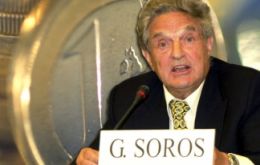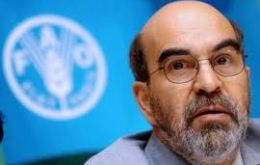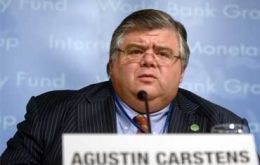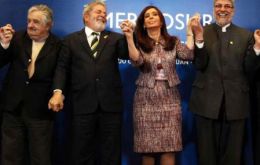MercoPress. South Atlantic News Agency
Politics
-
Monday, June 27th 2011 - 16:34 UTC
International Criminal Court issues arrest warrant for Libyan leader Gaddafi

The International Criminal Court issued an arrest warrant for Libyan leader Muammar Gaddafi, and rebels trying to oust him said their forces had advanced to within 80 km of the capital Tripoli.
-
Monday, June 27th 2011 - 15:00 UTC
Soros: EU on verge of economic collapse; some countries will have to exit the Euro

US/UK Hungarian born billionaire investor George Soros says a country will eventually exit the Euro zone and urged policymakers on Sunday to come up with a “plan B” that could rescue the European Union from looming economic collapse.
-
Monday, June 27th 2011 - 06:48 UTC
Brazil’s former Food Security minister voted next FAO Director General

The United Nations’ food agency, FAO, elected Brazil’s Jose Graziano da Silva as its Director General, the first new leader in almost two decades as the world faces near-record food prices that are driving millions into poverty.
-
Monday, June 27th 2011 - 06:44 UTC
Australia, Canada and most of Latam support Mexican candidate as IMF chief

Australia and Canada said they support Mexican central bank Governor Agustin Carstens for the top job at the International Monetary Fund over his rival Christine Lagarde, the French finance minister.
-
Monday, June 27th 2011 - 06:24 UTC
Parlasur member claims Mercosur summits have become ‘display of empty rhetoric’

Mercosur summits have become a display of empty rhetoric, full of protocol and ‘family photos’ but with no full hearted willingness to achieve a solid, fair integration, claimed the head of the Paraguayan delegation before Parlasur, the Mercosur Parliament.
-
Monday, June 27th 2011 - 06:09 UTC
US think-tank says hedge funds are behind “land grabs” in Africa

Hedge funds are behind “land grabs” in Africa to boost their profits in the food and bio-fuel sectors, a US think-tank says. In a report, the Oakland Institute said hedge funds and other foreign firms had acquired large swathes of African land, often without proper contracts. It said the acquisitions had displaced millions of small farmers.
-
Monday, June 27th 2011 - 05:59 UTC
Rioting in Buenos Aires as emblematic football team in relegated to second division

One of the great clubs of South American football, River Plate was relegated on Sunday from the Argentine first division for the first time in their 110-year history triggering clashes between enraged fans and the police that left dozens hospitalized and arrested.
-
Monday, June 27th 2011 - 05:39 UTC
Provincial vote in extreme north and south confirm support for Cristina Fernandez

Provincial voting in the extreme north and extreme south of Argentina confirmed on Sunday support for the administration of Cristina Fernandez de Kirchner and her ‘development model’ to be tested next October when she will be running for re-election.
-
Monday, June 27th 2011 - 05:33 UTC
Sao Paulo celebrates Gay Pride Day with the largest world turnout

Hundreds of thousands of people dancing and wearing costumes packed on Sunday the streets of Sao Paulo, South America's biggest city to celebrate June 26 gay pride day and call for an end to homophobia.
-
Sunday, June 26th 2011 - 02:51 UTC
Contradictory reports on the health condition of President Chavez

Venezuela’s Deputy Foreign Affairs minister Temir Porras said on Saturday President Hugo Chavez was rapidly recovering from surgery and described reports to the contrary published in the Miami press as ‘day dreaming’
